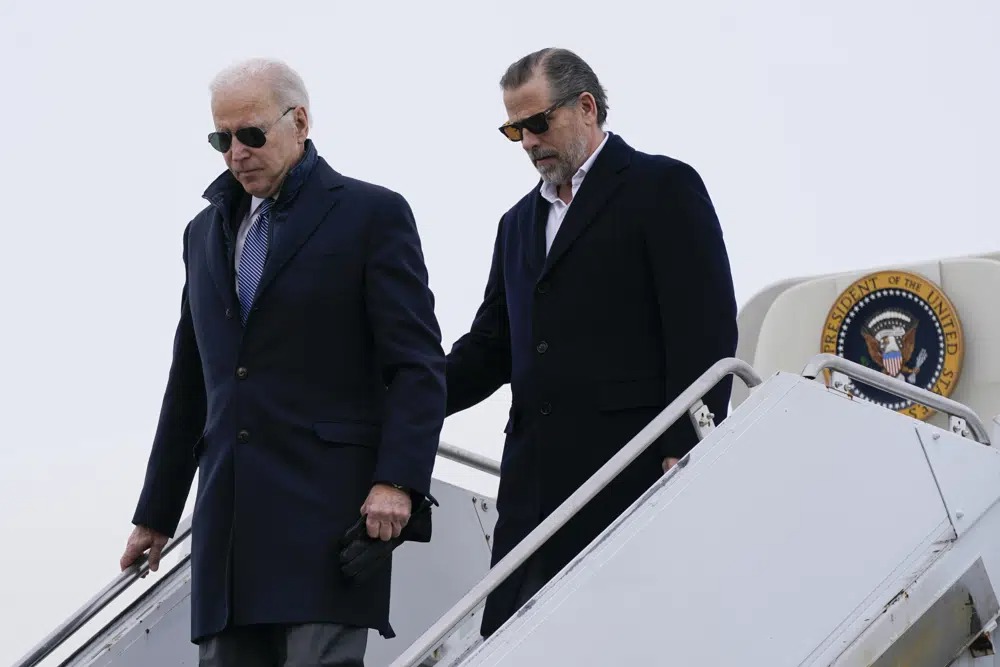House Republicans are expected to question former Twitter executives about the platform’s handling of reporting on Hunter Biden, the president’s son, fulfilling a party promise to investigate what they have long asserted is anti-conservative bias at social media companies.
Three former executives will be appearing Wednesday before the House Oversight and Accountability Committee to testify for the first time about the company’s decision in the weeks before the 2020 election to initially block from Twitter a New York Post article about the contents of a laptop belonging to Hunter Biden.
The witnesses Republicans subpoenaed to testify are Vijaya Gadde, Twitter’s former chief legal officer; James Baker, the company’s former deputy general counsel; and Yoel Roth, former head of safety and integrity.
Democrats have a witness of their own, Anika Collier Navaroli, a former employee with Twitter’s content moderation team. She testified last year to the House committee that investigated the Capitol riot about Twitter’s preferential treatment of Donald Trump until the then-president was banned from Twitter two years ago.
The hearing is the GOP’s opening act into what lawmakers promise will be a widespread investigation into President Joe Biden and his family, with the tech companies another prominent target of their oversight efforts.
“Americans deserve answers about this attack on the First Amendment and why Big Tech and the Swamp colluded to censor this information about the Biden family selling access for profit,” Rep. James Comer of Kentucky, the committee chairman, said in a statement announcing the hearing.
The New York Post first reported in October 2020, weeks before the presidential election, that it had received from Trump’s personal lawyer, Rudy Giuliani, a copy of a hard drive from a laptop that Hunter Biden had dropped off 18 months earlier at a Delaware computer repair shop and never retrieved. Twitter blocked people from sharing links to the story for several days.
Months later, Twitter’s then-CEO, Jack Dorsey, called the company’s communications around the Post article “not great.” He added that blocking the article’s URL with “zero context” around why it was blocked was “unacceptable.”
The newspaper story was greeted at the time with skepticism due to questions about the laptop’s origins, including Giuliani’s involvement, and because top officials in the Trump administration had already warned that Russia was working to denigrate Joe Biden before the White House election.
The Kremlin had interfered in the 2016 race by hacking Democratic emails that were subsequently leaked, and fears that Russia would meddle again in the 2020 race were widespread across Washington.
Just last week, lawyers for the younger Biden asked the Justice Department to investigate people who say they accessed his personal data. But they did not acknowledge that that data came from a laptop that Hunter Biden is purported to have dropped off at a computer repair shop.
The issue was also reignited recently after Elon Musk took over Twitter as CEO and began to release a slew of company information to independent journalists, what he has called the “Twitter Files.”
The documents and data largely show internal debates among employees over the decision to temporarily censor the story about Hunter Biden. The tweet threads lacked substantial evidence of a targeted influence campaign from Democrats or the FBI, which has denied any involvement in Twitter’s decision-making.
Nonetheless, Comer and other Republicans have used the Post story, which has not been independently verified by The Associated Press, as the basis for what they say is another example of the Biden family’s “influence peddling.”
One of the witnesses on Wednesday, Baker, is expected to be the target of even more Republican scrutiny.
Baker was the FBI’s general counsel during the opening of two of the bureau’s most consequential investigations in history: the Hillary Clinton investigation and a separate inquiry into potential coordination between Russia and Trump’s 2016 presidential campaign. Republicans have long criticized the FBI’s handling of both investigations.
For Democrats, Navaroli is expected to counter the GOP argument by testifying about how Twitter allowed Trump’s tweets despite the misinformation they sometimes contained.
Navaroli testified to the Jan. 6 committee last year that Twitter executives often tolerated Trump’s posts despite them including false statements and violations of the company’s own rules because executives knew the platform was his “favorite and most-used … and enjoyed having that sort of power.”
The Jan. 6 committee used Navaroli’s testimony in one of its public hearings last summer but did not identify her by name.
(AP)











